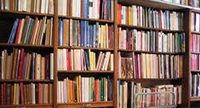Is « The Library » sustainable ?

Culture. Geneva, 17 December 2013. There is an English language library in Geneva: a spin-off of the „Emmanuel“ church, it was first called „The American library“, but has been renamed „The Library in English“. It is known by the public at large mostly due to its twice-yearly « booksale ». Alas, and as most libraries at the start of this new millenium, it is in jeopardy. Supported by the mere yearly fee of its users, it has seen its membership dwindle over the past few years. Can the « International Geneva » do without a library in English… while the international community is still growing ?
Of course, there are other places around to find books in English : there are some bookshops, first of all Books Off the Shelf (and now, a weekly paper, The News). Libraries at the United Nations and at the University of Geneva are full of books in English, mostly on trade, politics, science… But these places are not open to the public, although it is easy to get a reader’s card. The UN Library, anyhow, goes everyday more electronic, and the Encyclopaedia Britannica has been exiled in its most secret cellar. The Library in English has a « book discussion group », and there is a second one at the bookshop « Les Recyclables ». And beside the Library’s booksale, the Catholic parish John XXIII has a yearly bazaar full of books, and a « United Nations Women’s Bazaar » takes place each Fall. The International School also has a library, as well as other large private schools. But none of these is a real « Library in English » open to all ; so, the problems of that Library is not a question of positioning in the Geneva book scene, but an aspect of the great « print » crisis.
Of course, foreigners in Geneva are not all native English speaking people, but English is as always the common tongue to all. At the Palais des Nations, there are several clubs for book lovers : Spanish, Chinese, Arabic, Russian… and at the University, there are « Ciné Clubs » in the main languages. A French speaking person can do without a private library, as there will always be state-operated ones, and plenty of other sources of information on site in French. But a foreigner has to keep track of the cultural life of his or her country, which the web will not really supply. Thence this question for the second time : can the International Geneva do without a Library in English ? More generally, can the reader do without print books, as we hinted above ?
If books lose their public, it is not just that print is „passé“: maybe publishers and librarians are the first to blame for their downfall. The force of these two trades was the following. Publishers had the literary flair, intellectual muscle and advertising drive to reveal hidden talents to the public. As often, once that publishing industry became established, it defended more and more ist own intersets and culture. It is well known that nowadays, the public’s choice differs largely from the trade and prizes, is much more „sustainable“, as librarians admit. The largest publishing house today (Reeds-Elsevier) sits on hotels and airlines directories, plus prepaid science bulletins… and is turning now a databank company. As for the librarians, long before Melvil Dewey, they were experts in cataloguing and had a broad knowledge of sources and repositories. The web could have been their triumph, as some educators claimed for long that « the school of the future will be the library », or at least, library-centered. But librarians, too, have fallen into their navel, as one can witness at the « Library Science Talks », held monthly in Geneva and Berne (see ifla.org, and on Google : ailis, and oai). Modern librarians’ schools teach little beside software: „There were no media studies in our programme“, complained a disgruntled laureate. But with you joining the Library and the next workshop on « Innovation for scholarly communication », this may change.










